PROFILE • YACOUBA SAWADOGO
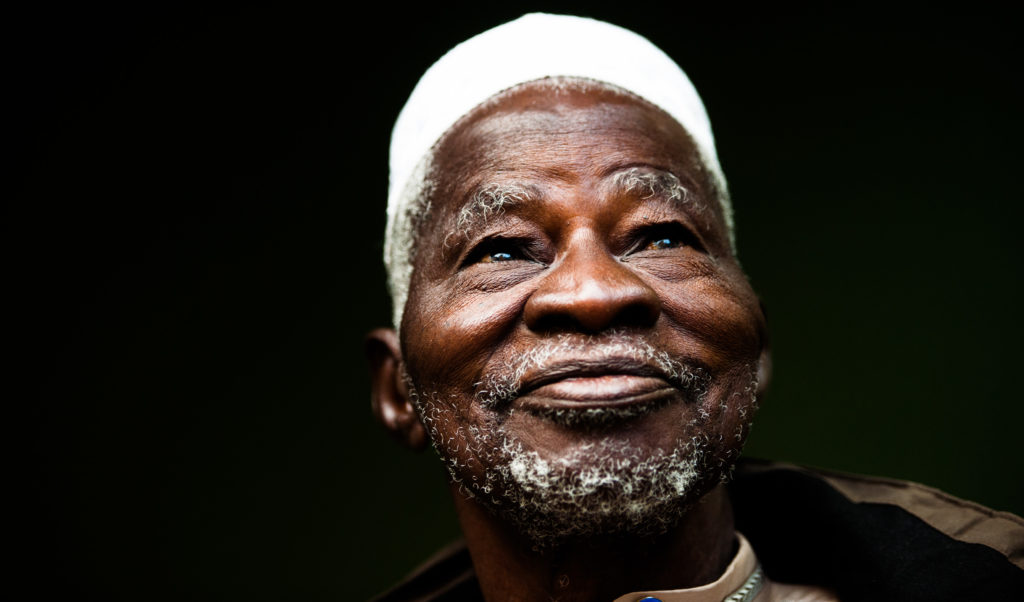
Credit: Wolfgang Schmidt.
Transforming the Sahel into a food garden
Through his innovative farming methods, a man with no formal education has brought hope to the people whose lives were threatened by desertification and soil degradation
BY Marian Pallister | Chair of Pax Christi Scotland
BURKINA FASO is a country that does not have to seek its problems. It is small, landlocked, and with neighbours whose news headlines are frequently alarming: Niger and Mali under attack from terrorists; Benin, considered among the West African coastal countries most vulnerable to a spill-over of Islamist violence from other landlocked Sahel countries; Togo increasing its military spending in the face of encroaching terrorism; Ghana attempting to deal with corruption; and ivory Coast, the world’s top cocoa producer, facing the impact of climate change on its most important crop.
Indeed, Burkina Faso is just another kid on the block in that troubled corner of the African continent, experiencing all of the above and starting 2022 with a military coup, carried out on the grounds that the President had not contained the growing Islamist threat. Lieutenant-Colonel Paul-Henri Damiba, who led that January take-over, said in his first speech that security was the country’s first priority.
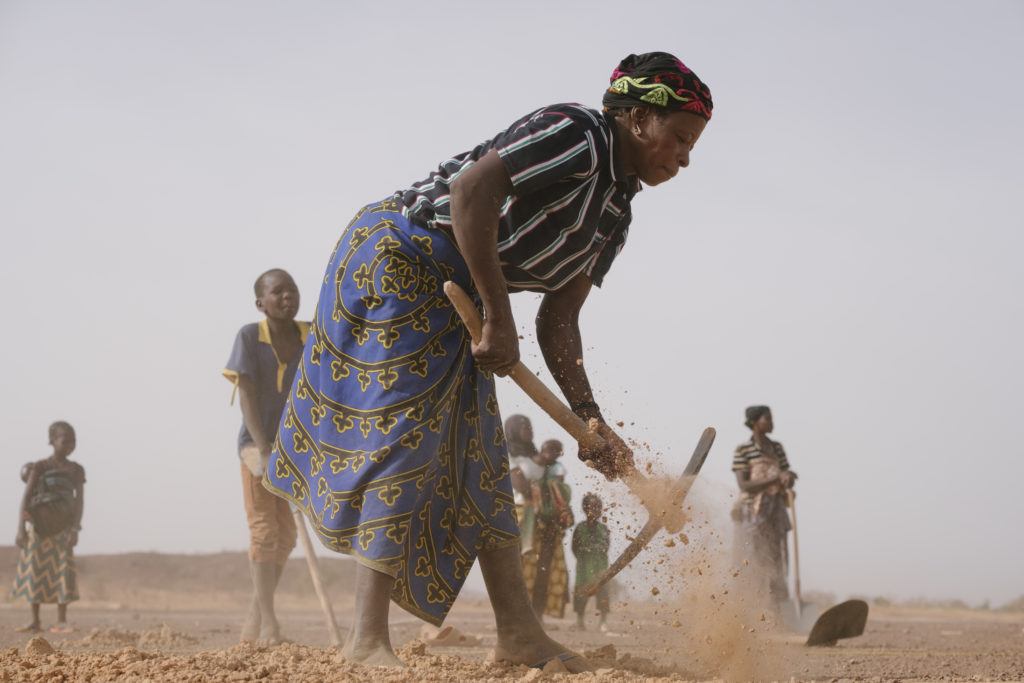
Of course, safety and peace must be the priority for countries worldwide, especially where terrorist threats exist. Leaders in any of those Sahel belt states, where desertification has for decades imposed soil degradation and increasingly frequent droughts, would have to place food security as a very close-run second on their list of priorities.
Surprisingly, on that front, Burkina Faso is blessed. It is home to one of the world’s foremost pioneers in reversing the effects of the climate emergency, a man whose methods for achieving food security have won acclaim in the United Nations’ corridors of power, and attracted eminent scientists from Europe and the United States.
A community brought back home
Yacouba Sawadogo has been described as “impressive and “inspiring” by Jim French, an agricultural advisor to Oxfam America; during Barak Obama’s presidency in the US, Sawadogo’s work was highly acclaimed by members of the Global Food Security operation.
His philosophy is that food insecurity must be addressed not only because of its immediate effects—a population facing hunger and possible starvation— but also because it causes tensions, civil unrest, and migration. The knock-on effects on future generations are immense, he suggests, because children cannot go to school if there is no food.
An eminent professor of environmental studies? A scientist specialising in sustainable agriculture? No—this is a man with no formal education, a man who wears that damning badge ‘illiterate’—a word that suggests not only a lack of education but is used as a cruel slur implying a lack of intelligence. Yacouba Sawadogo, however, oozes intelligence, know-how, imagination and foresight. His farming methods have greened part of the encroaching desert, brought a community back home to successfully grow crops—not only to feed their families but also to sell—and he has effectively disseminated his ideas to environmental leaders around the world.
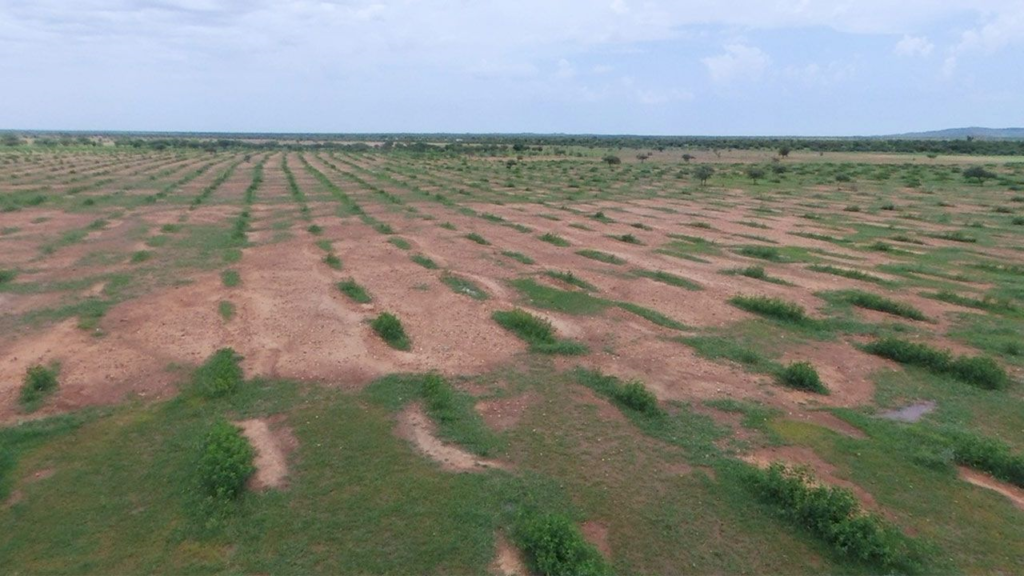
A UN report has shown that desertification and land degradation cost the world US$490 billion a year. No one knows better than Sawadogo that the repercussions are severe and wide-ranging, risking sustenance for at least a billion people across over 100 countries. He has seen first-hand the effects of long-term drought and that insidious creep of the Sahel.
Sahel, from the Arabic word Sāhil, is the semi-arid region stretching from Senegal east to Sudan, creating a transitional zone between the arid Sahara to the north and the belt of humid savannahs to the south. Traditionally in Burkina Faso, at least eight months of the year were dry, and rains came in June, July and August, averaging four to eight inches. Millet and groundnuts have been the main crops. Climate change has made those eight dry months dryer and longer, encroaching on the so-called rainy season. Lack of rains and flash floods have become the norms in many parts of Africa and the world but in Burkina Faso that lack has been especially hard.
Improving traditional methods
That was until Yacouba Sawadogo put a traditional method of growing back into practice, adding some ideas of his own to the mix. As he says now, “If you practice zaï, you can eat.” Convincing people back at the beginning was never easy, however. He was not only told that he was crazy, there were extremists who felt that tampering with zaï, by adding to the method, and using it at times of the year not designated by tradition, was almost a sacrilege and they used violence to stop him.
When he was a child, however, there had been a prophecy that he would succeed—and succeed he has. The boy who was bullied at Koranic school because he was the smallest in the class has become The man who stopped the desert—the name of a documentary that charts his success.
His innovation was to make the holes bigger and deeper, surround them with low walls, and add manure
Sawadogo was born in the small village of Gourga, son of a farmer. Sent away as a seven-year-old to a Koranic school in neighbouring Mali, he spent the next few years as a lonely little boy doing hard physical labour and attempting to learn the Koran. When he went home to Burkina Faso, this picked-on child still could not read, but before he left Mali the Sheik had called for him and told him, “One day you will be a leader of men.” Desperate to get home, where he would surely get the square meal his bullying fellow pupils had deprived him of for all those years, he carried those words of the Sheik in his heart.
He confesses that his family were “sad that I hadn’t learned much”, but they saw him in a different light when he opened up a market stall in the village that was a great success. “I got a new motorbike every six months,” he remembers. “I earned a lot of money.” If a new bike every six months makes him sound like a bit of a madcap, well, perhaps—but he added that he knew this wouldn’t last and so he was putting money aside for the future. In the 1970s and 1980s, the rains became so infrequent that 75% of the people left Gourga and the neighbouring villages. Sawadogo stayed, remembering what the Sheik in Mali had told him, and feeling that his time had perhaps come.
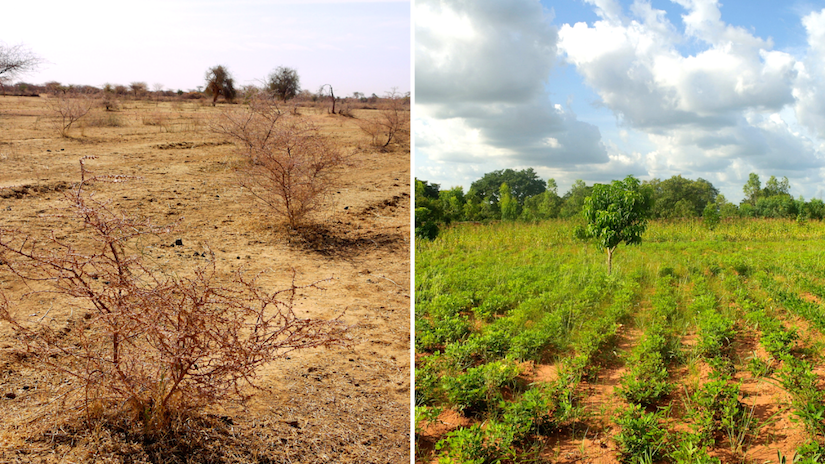
Text: Willem Van Cotthem/desertification.wordpress.com. Photo: Ecosia.
He of course knew the tradition of zaï. This method of farming used in Burkina Faso, Niger and Mali to restore lands subject to desertification involves digging pits about 20–30 cm long and deep and 90 cm apart in order to catch the water and concentrate compost. His innovation was to make the holes bigger and deeper, surround them with low walls, and add manure—and to do this ahead of the rains. Sawadogo understood this would provide plant nutrients, and that the manure would attract termites, whose tunnels would break up the soil even more. When the rains did come, this created ideal conditions not only for growing the traditional crops of sorghum and millet but even for growing trees. Of course, the root systems of trees further break down the soil, and reaching deep, they bring up valuable water to the surface.
Crops increased by up to 500%. A small forest grew but rather than being lauded as the hero, Sawadogo found himself the target of more bullying, this time by adults. Adults who believed that traditions should be kept pure; that to dig the zaï in the dry season was wrong; that to take manure into the bush at the “wrong” times should not be allowed.
Overcoming resistance
Hoping to spread the word about the success of his adaptation of zaï, Yacouba Sawadogo dressed in his best and headed for the Northern Province’s regional capital, Ouahigouya, where he told the new governor all about these innovative methods and their positive results. The fields he had treated were full of crops and his little forest had become dense since he began the experiments. His appointment with the governor was at eleven o’clock in the morning, and at that very hour, billowing smoke could be seen on the horizon in the direction of his home. Those who objected to his tampering with tradition had set fire to his crops and forest while he was away. He recalls the feeling of devastation when he learned that the fire he could see from the city was the destruction of his ten acres of crops and newly planted trees.
It says much about the man that rather than being defeated by this act of aggression, he instead decided to expand his project, working even harder to make it succeed.
Crops increased by up to 500%
Gradually, as others saw what his variations on zaï could produce, resistance lessened, enthusiasm grew, and in time, farmers began to come from elsewhere in Burkina Faso and beyond to learn from him. He was only too happy to share his ideas and to give advice. Between 1975 and 1985, so many left his village because of land degradation. Seeing how he survived that and subsequent droughts has given a lifeline to thousands of families, and Yacouba Sawadogo himself (now in his seventies) sells top quality seeds so that others can match his success using his version of zaï.
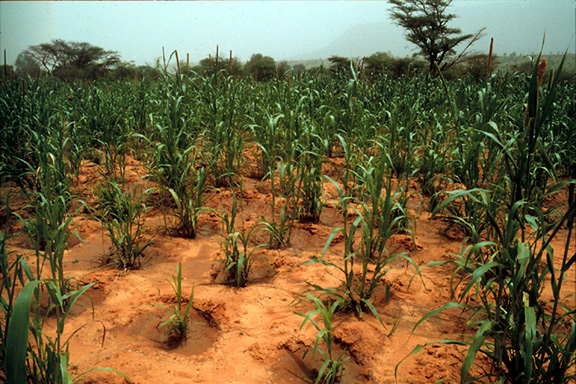
It was when scientists and agriculturists from abroad saw what Sawadogo was achieving that things really took off. Oxfam America funded the project. Chris Reij, a Sustainable Land Management specialist and Senior Fellow of the World Resources Institute in Washington, active in its Global Restoration Initiative, is a massive fan of Sawadogo’s work.
Reij says, “He is such a good farmer. He doesn’t read or write. If he had been to school he would have been a professor. Researchers have all been impressed by what they saw. None had been able to design such a package as Yacouba.”
Which is why Sawadogo was invited to Washington DC, to the UN HQ and why he is the recipient of international accolades such as the 2018 Right Livelihood Award and 2020 Champions of the Earth Award.
There have been new threats from city expansion, but his philosophy is that “Injustice turns a man nasty. Goodness touches everyone.” He is determined to continue increasing the level of biodiversity on his land and to bring food security to his country and beyond. Who needs a string of degrees when such innate wisdom can achieve so much?
| Dates To Remember |
|
April 2 – World Autism Awareness Day 4 – International Day for Mine Awareness and Assistance in Mine Action 6 – International Day of Sport for Development and Peace 7 – International Day of Reflection on the 1994 Genocide in Rwanda 7 – World Health Day 15 – Good Friday 17 – Easter Sunday 21 – World Creativity and Innovation Day 22 – International Mother Earth Day 23 – English & Spanish Language Day 24 – International Day of Multilateralism and Diplomacy for Peace 25 – World Malaria Day 28 – World Day for Safety and Health at Work 30 – Our Lady, Mother of Africa 30 – International Jazz Day May 1 – St Joseph the Worker, Workers’ Day 3 – World Press Freedom Day 8 – Remembrance and Reconciliation for Victims of Second World War 8 – World Migratory Bird Day 15 – International Day of Families 17 – World Telecommunication and Information Society Day 20 – World Bee Day 21 – World Day for Cultural Diversity for Dialogue and Development 22 – International Day for Biological Diversity 29 – Ascension of the Lord 29 – International Day of UN Peacekeepers 30 – World No-Tobacco Day |
